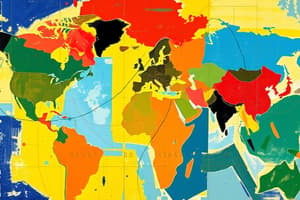Podcast
Questions and Answers
What are the potential consequences of high levels of energy expenditure during migration?
What are the potential consequences of high levels of energy expenditure during migration?
Diminished productivity, impaired cognitive function, weakening of physiological systems
Why do children and older adults typically experience higher energy costs during migration?
Why do children and older adults typically experience higher energy costs during migration?
Due to their lower metabolic rates compared to younger adults
What are the three main types of challenges faced by migrants during their journey?
What are the three main types of challenges faced by migrants during their journey?
Logistical, social, and psychological challenges
What are some examples of logistical challenges migrants might face during migration?
What are some examples of logistical challenges migrants might face during migration?
How do social challenges impact migrants during their journey?
How do social challenges impact migrants during their journey?
What are some psychological stressors that migrants may experience?
What are some psychological stressors that migrants may experience?
What factors influence the amount of energy expended during human migration?
What factors influence the amount of energy expended during human migration?
How does reduced access to nutritious foods during migration impact migrants' caloric intake?
How does reduced access to nutritious foods during migration impact migrants' caloric intake?
Why do migrants carrying heavier loads consume more calories per mile walked?
Why do migrants carrying heavier loads consume more calories per mile walked?
What challenges do migrants face when they have to walk extended distances with limited resources?
What challenges do migrants face when they have to walk extended distances with limited resources?
How does fleeing conflict zones impact migrants' access to food and water supplies?
How does fleeing conflict zones impact migrants' access to food and water supplies?
What are some consequences of reduced caloric intake for migrants during migration?
What are some consequences of reduced caloric intake for migrants during migration?
Study Notes
Migration: Energy Expenditure and Challenges
Migration is a complex phenomenon involving movement of individuals from one location to another. This movement can range from temporary relocation within the same country to permanent settlements in foreign lands. Two fundamental aspects related to this process are energy expenditure and the various challenges encountered by migrants.
Energy Expenditure During Migration
Energy expenditure refers to the amount of physical effort required to complete tasks such as walking, running, carrying heavy loads, or even just maintaining balance while traveling over difficult terrains. When it comes to human migration, the energy expended depends on several factors including age, gender, body size, speed of travel, load carried, and environmental conditions.
Migrants often face situations where they need to walk extended distances with limited resources, which requires considerable amounts of energy. For instance, when people flee conflict zones, they may have to cover great distances without proper food or water supplies. In these cases, their daily caloric intake decreases significantly due to reduced access to nutritious foods, leading to increased vulnerability and malnutrition. Furthermore, those who carry heavier loads consume more calories per mile walked compared to lighter loads.
In addition to the direct impact on individual health, high levels of energy expenditure can also lead to diminished productivity, impaired cognitive function, and an overall weakening of physiological systems, making the transition to a new environment much harder. Additionally, children and older adults typically experience higher energy costs associated with migration because of their lower metabolic rates compared to younger adults.
Challenges Faced by Migrants
The migration journey presents numerous challenges beyond merely the physical exertion involved. These difficulties can be broadly categorized into three main types: logistical, social, and psychological challenges.
Logistically, migrants must navigate unfamiliar environments and sometimes hostile territory, ensuring their safety amidst landmines, armed conflicts, warzones, criminal activity, disease outbreaks, border closures, and other hazards. They might encounter problems securing documentation, finding safe routes, obtaining shelter, acquiring basic necessities like clean drinking water, sanitation facilities, and medical services.
Socially, migrants often face discrimination based on ethnicity, religion, cultural backgrounds, legal status, and economic power. They may struggle to assimilate into new communities, establish meaningful relationships, find employment opportunities commensurate with their skills, and gain recognition of their professional qualifications. All these issues can contribute to feelings of isolation, alienation, marginalization, and hopelessness among migrants.
Psychologically, the stressors inherent to migration may result in anxiety disorders, depression, PTSD symptoms, emotional distress, sleep disturbances, suicidal ideations, substance abuse, negative cognitions regarding self-worth and coping abilities, and strained interpersonal relations. Some studies suggest that vulnerable groups like women, children, elderly persons, refugees, internally displaced populations, stateless people, and indigenous peoples tend to bear a disproportionately large burden of mental health consequences from migration.
Conclusion
Understanding the significant effects of energy expenditure during migration and the diverse set of challenges confronting migrants allows us to appreciate the complexity of this global issue. While migration has been a natural part of human history, the scale at which it occurs today poses unprecedented challenges to societies worldwide. Addressing these challenges necessitates concerted efforts from governments, international organizations, non-governmental agencies, local communities, and civil society to ensure migrant wellbeing throughout their journeys. This includes providing adequate support in terms of infrastructure, healthcare, education, job training, integration programs, and psychosocial assistance. By understanding the unique needs of different migrant populations, policymakers can develop strategies tailored to improving their experiences during transit and resettlement processes.
Studying That Suits You
Use AI to generate personalized quizzes and flashcards to suit your learning preferences.
Description
Test your knowledge on energy expenditure during migration and the challenges faced by migrants. Explore the impact of physical effort, factors affecting energy expenditure, and the logistical, social, and psychological challenges encountered during migration journeys.




